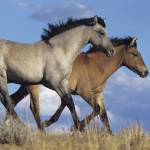What Diet Is Best for Horses with PSSM?

Polysaccharide storage myopathy (PSSM) is a genetic disease that can cause muscle cramping and stiffness. The purpose of this exercise trial was to determine the effects of four diets varying in starch and fat content on blood glucose and insulin concentrations as well as on indicators of exercise-induced muscle strain and damage in horses with PSSM.
Horses had greater blood glucose and insulin responses when they were fed a traditional high-starch diet (sweet feed composed of 45% corn, 45% oats, and 10% molasses). As the proportion of starch was lowered and proportions of fat and fiber were raised in the diet, blood glucose and insulin responses after a meal decreased. The most even plane of energy use was found among horses eating Re-Leve®, a low-starch, high-fat commercial concentrate made of soy hulls, rice bran, soybean, corn oil, wheat, and pellet binder. While the amount of post-exercise muscle stiffness varied among horses on all diets, horses on the high-starch diet exhibited the most muscle stiffness and those on the Re-Leve diet exhibited the least muscle stiffness.
Results of this study indicate that horses with polysaccharide storage myopathy benefit from diets such as Re-Leve that are lower in starch and higher in fat and fiber than traditional sweet feeds. Low-starch, high-fat feeds tend to minimize large fluctuations in blood glucose, and horses eating these rations will experience fewer and less severe episodes of muscle damage and stiffness.
Although the cause of muscle stiffness in horses with PSSM is not completely understood, simple dietary modification can allow these horses to train and perform with little or no discomfort.
This report of KER’s 2004 research was published in Journal of Veterinary Internal Medicine.
Read the entire research paper, titled The Effect of Varying Dietary Starch and Fat Content on Serum Creatine Kinase Activity and Substrate Availability in Equine Polysaccharide Storage Myopathy.








